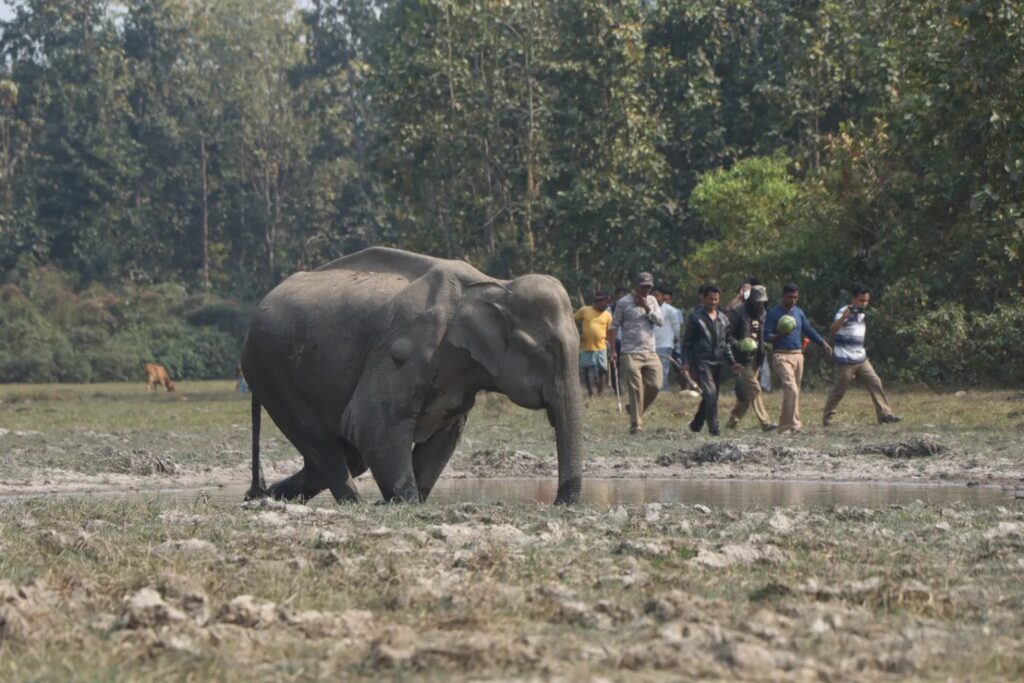Rice As A Peace Offering In Human-Elephant Conflict Capital Assam
Oct 1, 2023 | Pratirodh Bureau
The shrinking natural habitat of Asian elephants (Elephas maximus) has long led to conflict over food and space between them and humans in the state of Assam (Representational Image)
The state of Assam in northeastern India has one of the highest incidences of human-elephant conflict in the country, with more than 70 people and 80 elephants dying every year in these encounters. The shrinking natural habitat of Asian elephants (Elephas maximus) has long led to conflict over food and space between them and humans.
In the rice fields of Assam’s eastern Golaghat district, the moist soils can be seen cratered with trails of shallow holes. This is where the wild elephants have walked, browsing the fields for the crop they’ve developed a taste for. Where entire herds have passed through, the fields are riddled with craters all over.
Binod Dulu Bora, a conservationist with the nonprofit organization Hati Bondhu, is trying to find solutions.
In affected villages, huge swaths of farmland had been left empty by the farmers tired of conflict with elephants, and some of these fields lay right across elephant corridors. This gave Hati Bondhu an idea: Bora would experiment with growing rice in some fields to attract the elephants. He said he hoped the animals would then leave the other fields alone. Bora’s wife, Meghna Hazarika, also a conservationist, says they’ve observed that the elephants, too, want to avoid conflict and maintain a distance when they have the choice.
The elephants entered people’s backyards, too, in search of jackfruit and banana, say the women from Thuramukh village, adding that they’re tired of losing their food. So it was a “Herculean task” to get the villagers to agree to give up their land for rice for the elephants, says Pradip Bhuyan, the president of Hati Bondhu.
Bora first approached the women with the idea, who eventually agreed to convince the men, too. The farmers soon started preparing their land to grow rice for this project.
Mongabay and Mongabay-India collaborated with One World Media, which followed Hati Bondhu’s work to produce this short documentary on the topic.
In November 2022, when the rice was ready for harvest in Thuramukh, Bora’s team worked on guiding the elephants to these fields after nightfall using torchlight and fireworks. Hati Bondhu counted more than 100 elephants feeding on the rice over the course of 25 days in Thuramukh while the farmers harvested their own crops away from them.
Villagers have expressed appreciation for the project that prevented conflict for about a month during the harvest season. Bora’s team now plans to identify more conflict zones in other villages and raise awareness about human-elephant coexistence.
Aritra Kshettry, WWF-India’s national lead for elephant conservation, says elephants eat up to 200 different species of plants, although they’re primarily grazers. He acknowledges that a problem that could arise due to this project is that, since not all elephants are used to rice, this easy access to the inviting crop with no conflicts will introduce the taste to more elephants.
Bora talks about challenges, too. “This is just a temporary solution to immediately stop the conflict,” he says. He adds there needs to be a long-term solution. Hati Bondhu is now exploring the possibilities of growing bamboo, another favorite of the elephants, and fast-growing grasses on the surrounding hills. Bora says he expects a large-scale project can lead to an entire year free of conflict.
Hati Bondhu says it’s grateful for the villagers for donating their land for this trial in coexistence and conservation. Between 2019 and 2023, around 60 villagers from Hatikhuli and Thuramukh villages have given up to 52 hectares (128 acres) of land to grow rice for elephants.
(This article is republished from Mongabay. Read the original article here)
